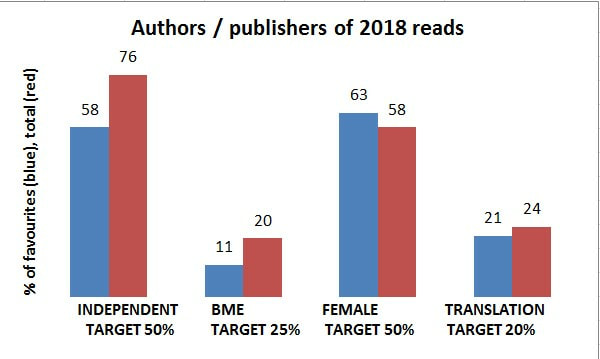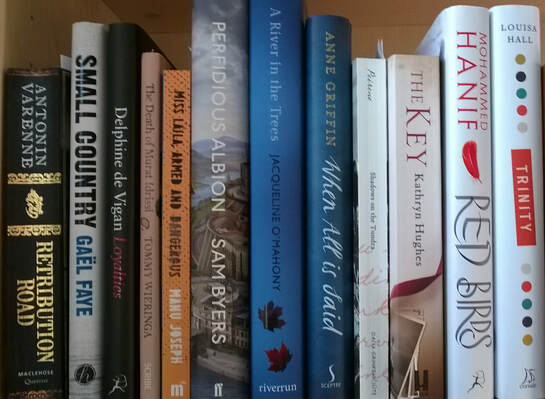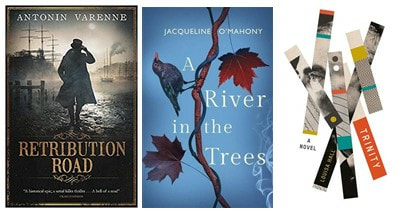| In January last year, I posted on my goals to ensure that at least 50% of the books I read were from independent publishers and/or by female authors. Convinced that diversity is good for the brain, I aspired to make 20% of my reading choices translations. My analysis, posted earlier this month, showed I achieved on all three, but failed a fourth target of 25% BME authors. So what are the implications, if any, for my reading across the coming year? |
I’ve decided to keep monitoring these areas – after all, I’ve figured out how to work the spreadsheet to produce my pretty graphs – but I’m not going to report them here until the end of the year. Instead, I’ll be prioritising a couple of other strategies for reading diversely, focusing on women in translation and reading from around the world, categories that might overlap but won’t necessarily.
In my post for women in translation month last August, I flagged seven qualifying books I’d read over the previous twelve months. The stories took me around the world to Europe (Germany, Denmark, Sweden, Iceland) and beyond (Iran, Oman and Japan). But I’m determined to beat that between September 2018 and August 2019. Given that, five months in, I’ve read six qualifying books, I ought to manage easily. So I set myself a goal of reading another six women in translation by the end of the “academic” year.
The following month I had fun totting up the thirty-two countries I’d visited virtually since the beginning of the year via my post on Reading the world. Not having anything better to do with my time (!) I’ve extended that list both from my pre-2018 reviews and new books I’ve reviewed between September and now. My list now stands at 70, but that’s still less than half the 195 countries in the world. Can I find another thirty to reach 100 countries in fiction by the end of 2019?
My third reading goal overlaps with my writing/promotion goals and is as vague as some of them! But I want to be more focused on supporting writers I can learn from and for whom that support has the potential to make a difference, however small, i.e. good writers but not necessarily the highest flyers. I was delighted when Elizabeth Lowry, author of Dark Water joined in the comments on my review and elsewhere I’ve had some conversation with Lissa Evans about Old Baggage and with Louisa Hall about Trinity. No surprise it’s women writing hard-to-pin down fiction where that most seems to matter (although, to be fair, I have had acknowledgement from male authors in the past).
My reading year has got off to a good start with reviews of eleven novels and a memoir. Tap or click on the image to see them all.
Published by Riverrun, A River in the Trees by Jacqueline O’Mahony is another novel with a historical strand; in this case the conflict is the Irish War of Independence. There’s also the contemporary thread about a woman at a crossroads in her life toying with returning to her roots. I loved it for the moral issues (subtly explored) in fighting for freedom and for the beauty of the writing.
History again for Louisa Hall’s Trinity, published by Corsair, is a beautifully written meditation on bombs and betrayal, patriotism and paranoia around the development, deployment and aftermath of the original weapon of mass destruction.
Over to you now! How’s your reading year going so far and have you set any goals? What do you think of mine?
























 RSS Feed
RSS Feed





















